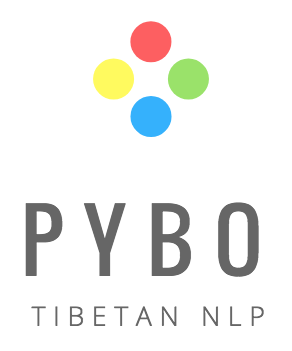pybo is a word tokenizer for the Tibetan language entirely written in Python. pybo takes in chuncks of text, and returns lists of words. It provides an easy-to-use, high-performance tokenization pipeline that can be adapted either as a stand-alone solution or compliment.
pip install pybo
Or if you for some reason want to install from the latest Master branch:
pip install git+https://github.com/Esukhia/pybo.git
# initialize the tokenizer
tok = bo.BoTokenizer('POS')
# read in some Tibetan text
input_str = '༄༅། །རྒྱ་གར་སྐད་དུ། བོ་དྷི་སཏྭ་ཙརྻ་ཨ་བ་ཏ་ར། བོད་སྐད་དུ། བྱང་ཆུབ་སེམས་དཔའི་སྤྱོད་པ་ལ་འཇུག་པ། །སངས་རྒྱས་དང་བྱང་ཆུབ་སེམས་དཔའ་ཐམས་ཅད་ལ་ཕྱག་འཚལ་ལོ། །བདེ་གཤེགས་ཆོས་ཀྱི་སྐུ་མངའ་སྲས་བཅས་དང༌། །ཕྱག་འོས་ཀུན་ལའང་གུས་པར་ཕྱག་འཚལ་ཏེ། །བདེ་གཤེགས་སྲས་ཀྱི་སྡོམ་ལ་འཇུག་པ་ནི། །ལུང་བཞིན་མདོར་བསྡུས་ནས་ནི་བརྗོད་པར་བྱ། །'
# run the tokenizer
tokens = tok.tokenize(input_str)
# access the first token in the iterable
tokens[0]
This will yield:
content: "༄༅། "
char_types: |punct|punct|punct|space|
type: punct
start: 0
len: 4
syls: None
tag: punct
pos: punct
skr: "False"
freq: 0
notes:
startis the starting index of the current token in the input string.sylsis a list of cleaned syllables, each syllable being represented as a list of indices. Each index leads to a constituting character within the input string.
# iterate through the tokens object to get all the words in a list
[t.content for t in tokens]
# extract nouns from the tokens
[t.content for t in tokens if t.tag == 'NOUNᛃᛃᛃ']
These examples highlight the basic principle of accessing attributes within each token object.
pybo is an open source library for Tibetan NLP.
We are always open to cooperation in introducing new features, tool integrations and testing solutions.
Many thanks to companies and organizations who supported the development of pybo, especially:
- Khyentse Foundation for contributing USD22,000 to kickstart the project
- The Barom/Esukhia canon project for sponsoring training data curation
- BDRC for contributing 2 staff for 6 months for data curation
Build the source dist:
rm -rf dist/
python3 setup.py clean sdist
and upload on twine (versio >= 1.11.0) with:
twine upload dist/*
The Python code is Copyright (C) 2019 Esukhia, provided under Apache 2.
author: Drupchen
contributors:
